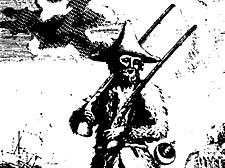 |
Crusoe’s creator is put on the Freudian couch
He has been acknowledged as the first novelist of the English language and the father of journalism, but what was Daniel Defoe’s secret asks Jonathan Fryer
The Bisexuality of Daniel Defoe by Leo Abse. Karnac Books, £19.99. order this book
DANIEL Defoe is best known these days as the author of the novel Robinson Crusoe, which is often presented (in expurgated editions) as a children’s adventure story. It’s the ultimate castaway fantasy, set on a remote desert island. But as adult readers of the (unexpurgated) version have long known, there is much that is dark and troubling in what is essentially an allegory, not least regarding cannibalism and colonial attitudes to “natives”.
But Defoe himself would doubtless be taken aback by some of the readings that the octogenarian former politician and psycho-biographer Leo Abse gives to this and other examples of his work. The Oedipus Complex, voyeurism and copraphilia (attaining sexual gratification by eating the feces of another) all figure prominently within Abse’s critical apparatus in the book, not to mention the bisexuality of the title. Readers will not be surprised to learn that Sigmund Freud looms large in this volume.
Indeed, the book was launched at the Freud Museum in Hampstead, where one could almost see the ghostly figure of Defoe stretched out on the famous couch, maybe dressed as Moll Flanders.
Leo Abse had an older brother, Wilfred, who was a psychoanalyst, and he himself knew the celebrated Melanie Klein. Moreover, his work both as a lawyer and as a back-bench Member of Parliament gave him plenty of opportunity to observe self-important people in the grips of various forms of neurosis.
Earlier books by Abse included psychological studies of Margaret Thatcher and Tony Blair, both of them complex individuals. Furthermore, the author rubs salt into his previous subjects’ wounds by declaring at the very beginning of this book, “puny politicians are one matter; a literary genius like Daniel Defoe is another”.
Defoe has often been described as Britain’s “first novelist” as well as its “first journalist”, but in Abse’s eyes he is much more, not all of it very flattering, but then, flawed characters are so much more interesting than perfect ones, sinners more fun to read about than saints.
Defoe certainly had his flaws. He was a serial debtor and a businessman of quite spectacular incompetence. He had one hair-brained scheme to make perfume from civet cats, but creditors came and took the cats away. He only obtained release from one of his sojourns in prison by agreeing to become a spy. When things got too hot in England, he escaped to Scotland, but he was incapable of staying out of trouble.
Criticising arch-Tories in one of the innumerable satirical pamphlets he penned, he was sentenced to three days in the pillory. But instead of pelting him with rotten vegetables, stones or worse – as was the charming London custom at that time – the crowd showered him with flowers.
Defoe’s dour wife (whom, Abse suggests, he married largely out of masochism) might have disapproved of her spouse, but the plebs clearly thought he was a hero, cocking a snook at authority.
Therein, of course, lies much of his appeal for Leo Abse. Abse himself has been a tilter at windmills, though one with considerably more success than either Don Quixote or Daniel Defoe.
It was he who produced Private Members’ Bills that helped liberalise the laws on homosexuality and divorce. At the same time, he was a real dandy, turning up at the state opening of parliament sporting a cravat and flamboyant hat, while driving a Bentley. Not what one normally expects from a Labour MP from South Wales.
At the age of 89, Leo Abse still thrives on the unexpected, on thinking the unthinkable. He can be literally shocking, though in a profound rather than superficial way. Indeed, large chunks of this psycho-biography of Defoe and critical analysis of his major books are quite troublingly shocking.
Some critics, especially in university English literature departments, will probably be scathing about some of the Freudian theorising. But others will share the political journalist Anthony Howard’s view that the book presents its subject in an entirely fresh light, making it an exhilarating and enthralling read.
The editors at Karnac Books, which is based in Finchley Road, have wisely and courageously not interfered with Abse’s rhetorical style.
There is one memorable sentence, drawing its inspiration from Robinson Crusoe’s island, which has us accompanying Abse on a tug to the Shetland Islands campaigning against Scottish devolution; in Taipei (Taiwan) arguing for copyright protection; in Mauritius with a former Prime Minister, who confuses Leo with his younger brother the poet Dannie; outlining the Seychelles’ case for independence in the House of Commons; and discussing the cause of Tamil separatism with the president of Sri Lanka, all before one reaches a full stop. The book is not always an easy read, therefore. But stimulating and original it certainly is.
|



